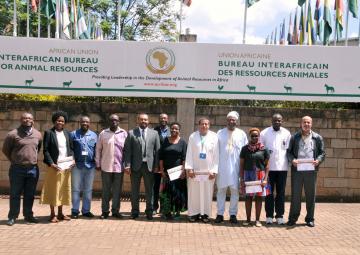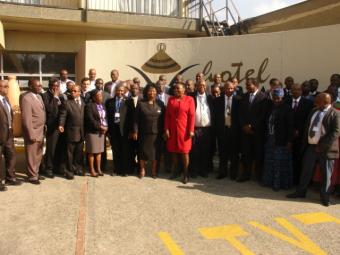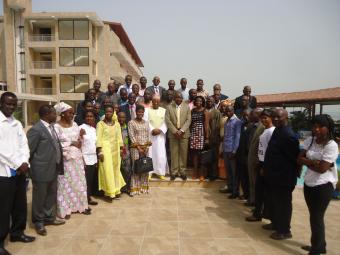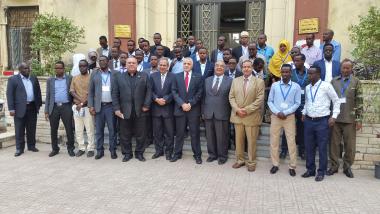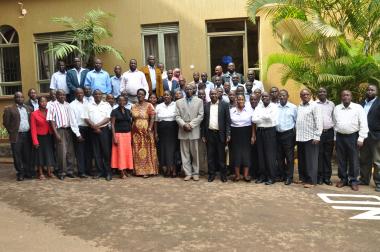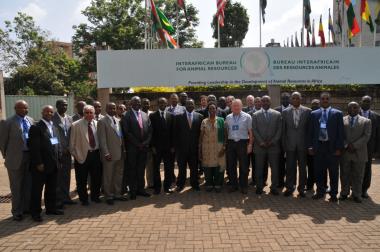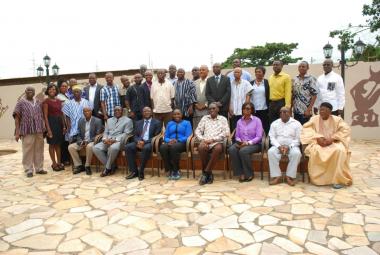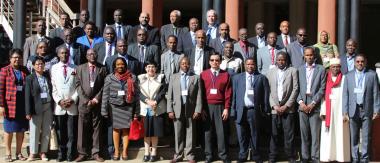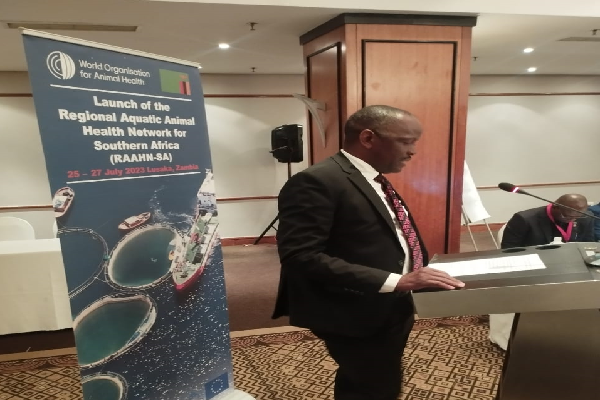
AU-IBAR was involved in the inauguration of the Regional Aquatic Animal Health Network (Southern Africa), which occurred in Lusaka, Zambia from 25-27 July, 2023. The event commenced with the official inauguration by His Excellency the Honourable Makozo Chikote, the Minister of Fisheries and Livestock of the Republic of Zambia. The event was attended by various individuals, including Dr. Moetapele Letshwenyo, the WOAH Regional Representative for Southern Africa; Dr. Berhanu Bedane, representatives from FAO; Dr. Yoseph Mamo, a representative from COMESA; a representative from the Network of Aquaculture Centres in Asia and the Pacific (NACA); a representative from WorldFish; representatives from the member states of the Southern African Development Community (SADC); a representative from the SADC Secretariat; and staff members from WOAH and AU-IBAR.
The agenda comprised of Keynote Presentations focusing on the current status of the Fisheries-Aquaculture sector and the potential for stakeholder engagement in the implementation of aquatic Sanitary and Phytosanitary (SPS) measures. These measures aim to protect the sector and enhance market access and trade opportunities within the region. There were four presentations delivered on the following topics: (i) WOAH Aquatic Animal Health, (ii) Strategy and Observatory, (ii) WOAH Aquatic Animal Health Standards Commission & PVS for Aquatic Animals, (iii) Strengthening the Capacity for Aquatic Animal Health and Biosecurity Control in Africa, and (iv) Overview of the SADC-Aquaculture Framework and the establishment of the Fisheries Monitoring Control and Surveillance Coordination Centre (MCSCC).
The meeting consisted of four primary sessions. The initial session provided an overview of the Situation Analysis, aiming to familiarise delegates with the current networks, review and update existing AA disease control strategies, and assess the aquatic animal disease situation in the region. The subsequent session entailed the formulation of the Terms of Reference pertaining to the advancement of the Regional Agricultural Assessment and Harmonisation Network (RAAHN). Various research groups examined various topics related to Public-Private Partnerships (PPPs) in the context of emergency preparedness and response. These topics encompassed areas such as laboratory capacity and diagnostics, research and development, knowledge sharing, and biosecurity. The third session entailed the formulation of the RAAHN Institutional Framework, specifically in the form of a preliminary statute that aligns with the preexisting regional institutional framework, considering the SADC Strategy, Framework, and Guidelines. During the fourth session, the delegates actively participated in the formulation of the RAAHN Inaugural Action Plan. This involved the identification of key tasks that would aid in the effective implementation of the RAAHN.
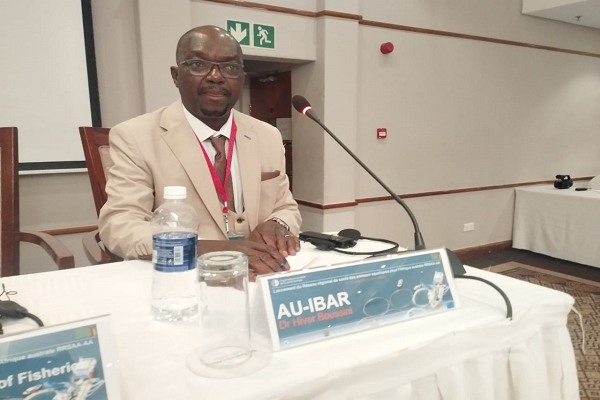
According to Dr. Hiver Bousinni (in above picture), who represented AU-IBAR's Acting Director, Dr. Nick Nwankpa, it was noted that "It is imperative to consider aquatic animal health and welfare, aquatic ecosystem health, safe trade, and public health concerns in order to achieve sustainable utilisation and management of fisheries and aquaculture resources for socio-economic benefits."
The inception of the network can be attributed to the suggestion put forth by the African Union Member States (AU-MS) and the Regional Economic Communities (RECs). The recommendation was informed by the examination of established global and continental animal health networks, which conform to the standards and guidelines established by the World Organisation for Animal Health (WOAH) and the Food and Agriculture Organisation (FAO). The establishment of a Regional Aquaculture and Agriculture Network for the Southern African Development Community is in accordance with the regional protocol and strategies concerning the fisheries and aquaculture industries. The primary objective of this initiative is to facilitate the progress of sustainable development in the fisheries and aquaculture sectors within the region. Additionally, it aims to bolster the trade of fish products within the region and foster regional integration. These efforts are intended to enhance livelihoods, create employment opportunities, and improve food and nutrition security.

